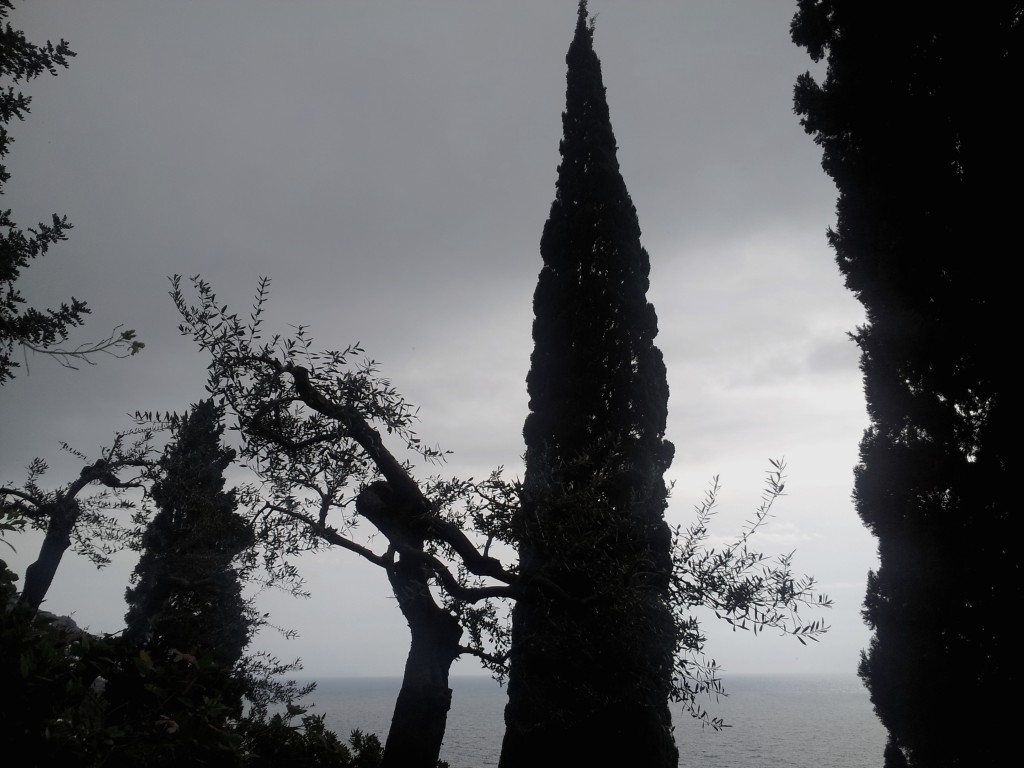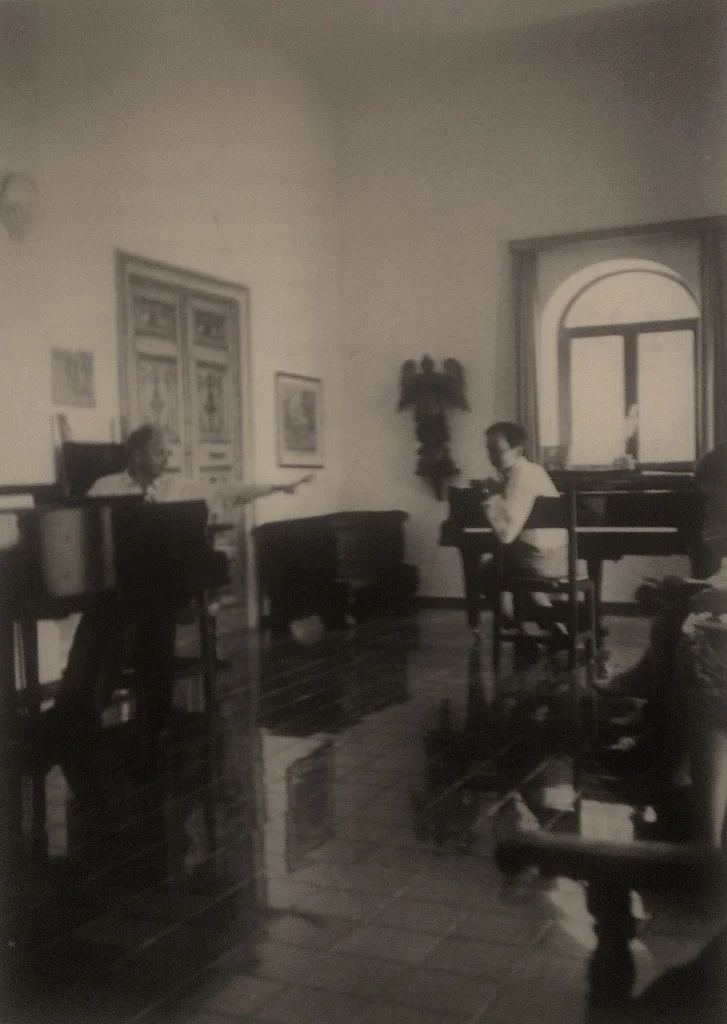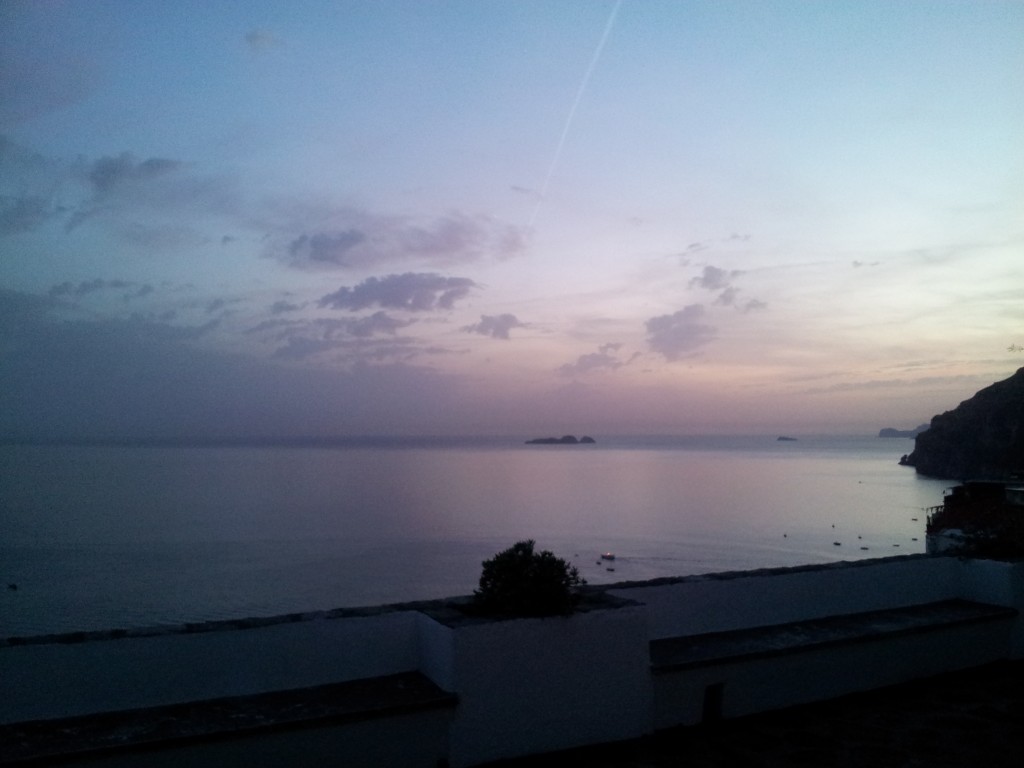A Half-Light between Heaven and Despair
The view from Casa Orfeo: Wilhelm Kempff’s mountain-top estate is today the home of the Kempff Foundation Beethoven Courses. He built the home especially for the purpose.
Two years ago, I was in Positano for an unforgettable period in October 2013–somehow the sense of awe was so much that I could not bring myself to write about it until now. Every year, eight pianists from around the world participate in an intense two-week course on the interpretation of Beethoven Sonatas, which were a specialty of the great German pianist Wilhelm Kempff. These take place in the Amalfi Coast of Italy, which is of a jagged, stark beauty. Started in 1957 by Kempff, the courses are today led by the very illuminating Bernd Goetzke, who was the final pupil of Arturo Benedetti Michelangeli. I was very ill for weeks before I arrived, and was still very unwell during my stay; the impressions were nevertheless for a lifetime. Anybody who has had any type of extended convalescence understands the type of transformation that one goes through–almost as though a soul has aged through years of wisdom in sped-up time that simultaneously seems frozen while going through it.
Wilhelm Kempff (1895-1991) was a master at spiritual illumination of music, and a poetic messenger of its essence. He was at his best in concert.
Wilhelm Kempff was a musician’s musician, whose nature on stage was unpredictable but often miraculous–his combination of spirit and intellect, as well as decades of experience, combined for performances of unusual power. The tradition of his teaching was apparently a lively one here, and I was privileged to have been a part of these courses for a few days.
This is how Positano appeared every night in the storms–every evening they enveloped the enclave.
Upon arrival, I immediately sensed something about the beauty here–it was other-worldly but not in the postcard sense–it is a jagged, Shakespearean beauty–a mirror of inner drama, a confrontation of the individual with himself with primordial power. I felt as though I had been transported to Prospero’s island with his desolation of spirit and barren surroundings. Every evening, a thunderstorm passed through, with elemental power. It was as a fairy tale. Climbing the steps of the mountains from the village to the Casa Orfeo was almost a spiritual ritual. During the rains, they were zen-like rivers of rainwater.
A very young Wilhelm Kempff looking fabulously ready for a Prussian winter
Casa Orfeo–the beauty here was stark: a confrontation of the individual with dramatic nature, jagged cliffs, and primordial weather
Lessons were daily, for many hours–one wished to absorb every note and every word as musical and spiritual truth for a lifetime. The teaching of Prof. Goetzke seemed to hold the very key to Beethoven, who himself was inspired by Shakespeare’s Tempest.
To me, Casa Orfeo was something akin to Prospero’s Lair–lonely, intense, and desolate. It felt like the edge of the world.
To climb nightly to the village for meals required climbing Shakespearean stairs, which became torrential rivers of rain flow every night with the storms
Even the entrance to Casa Orfeo seems legendary and medieval
Casa Orfeo is truly on an inhospitable mountain that somehow became a refuge
The vegetation is probably like that on Prospero’s Melonia–dramatic and other-worldly
I had enough strength to play the two F Major Sonatas of Beethoven–Opus 10#2, and Opus 54. I emerged from these lessons feeling like a changed person and musician, with renewed desire for better hearing, better sonic explorations, and more powerful dramatic narratives.
As night approached, one only sensed the sea as a vast presence and a void of energy in the darkness
Olive trees and lemon trees are stalwart presences on the cliffs
The half-light of this place is unique… it seems to describe an inward drama
Wilhelm Kempff teaches a student at the Beethoven Courses in Casa Orfeo
The views from the house seem to look to infinity
It would be impossible to forget the time here–one felt focused solitude for a musical retreat.
Today, the courses are lead by Bernd Goetzke, one of the most illuminating master teachers I have ever encountered–the last pupil of Arturo Benedetti Michelangeli
With Prof. Goetzke’s teaching, one senses the presence of a long and time-honored tradition of centuries of European art and culture–and an opening of the eyes, ears, and heart. I felt also the presence of not only the Kempff traditions in Beethoven, but the sonic and artistic world of Michelangeli as well.
Arturo Benedetti Michelangeli (1920-1995) in Cortina
I thought this would be a fine setting to stage theater, because of the purity of light and spirit
An eerie calm in the twilight
The dawn of a new day and hope
The whole time I was there, I could not escape the words from Tempest, Act 4 Scene 1–Prospero’s monologue, as read here unforgettably by Sir John Gielgud:
You do look, my son, in a mov’d sort,
As if you were dismay’d: be cheerful, sir.
Our revels now are ended. These our actors,
As I foretold you, were all spirits and
Are melted into air, into thin air:
And, like the baseless fabric of this vision,
The cloud-capp’d towers, the gorgeous palaces,
The solemn temples, the great globe itself,
Yea, all which it inherit, shall dissolve,
And, like this insubstantial pageant faded,
Leave not a rack behind. We are such stuff
As dreams are made on, and our little life
Is rounded with a sleep.




















